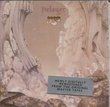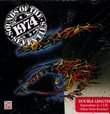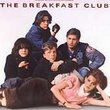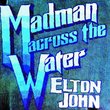| All Artists: Yes Title: Tales From Topographic Oceans Members Wishing: 4 Total Copies: 0 Label: Atlantic / Wea Release Date: 10/25/1990 Genres: Pop, Rock, Classic Rock Styles: Progressive, Progressive Rock, Album-Oriented Rock (AOR) Number of Discs: 2 SwapaCD Credits: 2 UPC: 075678132520 |
Search - Yes :: Tales From Topographic Oceans
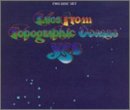 | Yes Tales From Topographic Oceans Genres: Pop, Rock, Classic Rock
|
Larger Image |
CD DetailsSimilar CDs
Similarly Requested CDs
|
CD ReviewsTales is Art Lonnie E. Holder | Columbus, Indiana, United States | 09/12/2006 (5 out of 5 stars) ""Tales" is a deeply philosophical album that is not for the meditative faint of heart. While much music is created to be toe-tapping and easy to sing to, "Tales" is in that genre usually called progressive rock, in a sub-genre that requires intense analysis to understand. The result is an album that is inaccessible and incomprehensible to a casual listener. In order to understand this music you must read the lyrics and listen, and listen, and then listen some more. Even then you might fail to gain a glimmer of Yes's intent.
"Tales from Topographic Oceans" would have to qualify as one of the most if not the most deeply complicated rock music ever created. Again, if you are a casual listener the complexity of the music can be frustrating or boring. However, if you consider that classical music is often complex, and to be understood requires extended focused listening, it should be of little surprise that Yes took that complexity for its own in the development of this music, creating a symphony in four movements. The first movement is titled "The Revealing Science of God: Dance of the Dawn." The lyrics have no meaning, and they also have meaning. Confusing? Oh yeah. Understand that the point of the movement is to get the listener to realize that there are bits and pieces of knowledge, and understanding is something that rarely, if ever, comes all at once. Jon Anderson uses the sound of the words to create an almost subliminal meaning. The whole point is that you are to realize that we do not understand, but we have to keep trying to understand. Also, when you find meaning, know that you found it within yourself. The second movement is "The Remembering: High the Memory." This song is about the breadth of knowledge that is available to humankind and to any one individual. However, the song is also trying to say that while that knowledge is available, each of us can only access that knowledge when it becomes a part of our personal knowledge, and more than just having it as personal knowledge, it must be accessible and understood to be useful. Another way of saying this is that we have realms of knowledge that are potentially available to each of us. However, only that knowledge which we personally understand and can access will be of any value to us. The third movement is "The Ancient: Giants under the Sun." The concept of this song is relatively simple compared to the first two movements. This song pushes through the envelope of recorded time to access forgotten knowledge from civilizations that came before. While the song is relatively easy to understand, the music is more interwoven and complex, and intertwines elements that are intended to evoke those earlier cultures. Therefore, the instruments flavor this movement with musical elements from around the globe to help give the feeling that the song of our knowledge is made up of many parts from many people. While the music sounds relatively simple, it is as technically detailed and complex as any concerto or symphony I can recall. While Steve Howe's guitar may be pivotal in this song according to Jon Anderson, Rick Wakeman's keyboards are essential to the ethnicity of the various portions of the music. This track is an incredible composition. This movement adds to the seeking of the first movement and the understanding of the second movement that there is knowledge yet available to be discovered from all cultures and civilizations that may no longer exist, but that understanding is still available if we know where and how to look for it. The fourth and final movement is "Ritual: Nous Sommes Du Soleil." This composition is relatively accessible philosophically because it is a description of the human condition. This piece is intended to communicate that we have the ability to seek knowledge and understanding. Part of that knowledge and understanding is the constant struggle between good and evil, and how that struggle plays a part of how we view that knowledge. However, this piece also reinforces the earlier movements in that we have the ability learn and to understand granted by a higher power. I've read that Rick Wakeman complained that there was too much filler in this composition. I suppose that could be said of many of the classical compositions by Beethoven, Tchaikovsky, Bach, and on and on. However, I've also read that Steve Howe thought that this was some of his best work ever. This work is magnificent in conception and scope. It is not readily accessible to the casual listener. The very best way to understand this music is to get a bottle of really good wine, sit in the middle of the room in a recliner, turn out most or all of the lights, and listen and feel. Start by paying attention to the emotion and feeling of the words, because that was the intent of the lyrics. Once you begin to understand what was intended, then this work becomes accessible. It is one of the most incredibly complex pieces of music I have ever heard, and I have listened to everything from classical to death metal. This music is not for everyone, but those who can get into it, it is fantastic. Note that there are several versions of this CD available. You may wish to survey the versions available to determine their price and availability before buying. Enjoy! " |

 Track Listings (2) - Disc #1
Track Listings (2) - Disc #1
